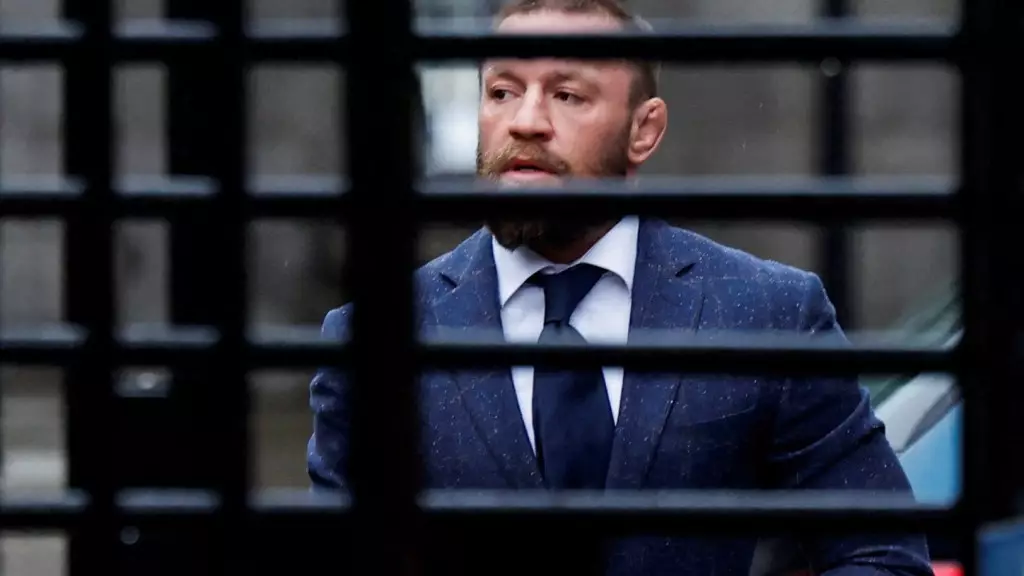Conor McGregor, once the unrivaled face of the Ultimate Fighting Championship (UFC), finds himself amidst a whirlwind of legal troubles and personal challenges that cast doubt on his future in the sport. Having not competed in over three years, the former dual-division champion’s absence raises significant questions about his career trajectory. His recent civil trial, which concluded unfavorably for him regarding serious allegations, marks a pivotal moment that may redefine the public’s perception of this iconic fighter forever.
The crux of the situation revolves around allegations made by Nikita Hand, who accused McGregor of assaulting her in a hotel room. The jury’s decision to hold him liable adds another layer to McGregor’s already complex narrative. With Joe Rogan, a well-known commentator and podcast host, expressing skepticism about McGregor’s return to the octagon, the conversation shifts from his fighting abilities to his lifestyle choices and mental well-being.
On the “Joe Rogan Experience,” Rogan openly questioned whether McGregor would ever compete again, emphasizing his observations of McGregor’s well-documented partying habits, including drug use. Rogan’s insights provide a glimpse into the potential ramifications of a fighter’s lifestyle outside the gym. He speculates that McGregor’s behavior may stem from deeper issues related to mental health, particularly regarding the impact of traumatic brain injuries that athletes can sustain throughout their careers.
In combat sports, the physical toll cannot be understated. Rogan notes the astonishing number of impacts fighters like McGregor endure, which can lead to long-lasting effects. As elite athletes often walk the fine line between performing at their best and risking their health, many choose to relieve the resulting physical discomfort through substance use. This could be a critical factor in understanding McGregor’s current state and his questionable decision-making.
Despite these ongoing challenges, there was a glimmer of hope for a potential return when McGregor announced plans to headline UFC 303 against Michael Chandler. However, a broken pinky toe forced him out of competition, adding to the uncertainty that now envelops his career. UFC President Dana White dismissed concerns about the legal outcomes impacting McGregor’s career, yet the repeated setbacks beg the question: when, if ever, will McGregor return to the octagon?
The unpredictability of McGregor’s next steps is exacerbated by whispers of an exhibition boxing match against Logan Paul, which adds another layer of ambiguity. While such an event might attract attention and offer McGregor a chance to showcase his skills outside of the UFC’s constraints, it also raises further questions about his commitment to mixed martial arts.
McGregor’s narrative serves as a stark reminder of the complexities of fame and success in sports. While he achieved enormous accolades and became a cultural icon, the pressure that comes with such status can be detrimental. The conversation about McGregor should expand beyond just the athlete—examining the structural challenges faced by fighters as they navigate fame, personal issues, and physical tolls throughout their careers.
This widespread scrutiny of an athlete’s life raises critical discussions about the support systems in place for fighters. With increasing awareness of mental health challenges, the sport’s governing bodies and organizations need to consider how they can better support athletes during and after their careers.
In a moment where Conor McGregor’s future appears ambiguous, both his fans and critics find themselves in a state of contemplation. The once unshakeable fighter is now enmeshed in a web of challenges that may forever alter his legacy. Whether McGregor can rise above these hurdles remains uncertain, but the journey emphasizes the realities of athletes grappling with their identities as competitors—both inside and outside the cage. As enthusiasts of the sport, it is essential to cultivate a deeper understanding of their struggles, fostering an environment that encourages healing and growth rather than mere spectacle.

